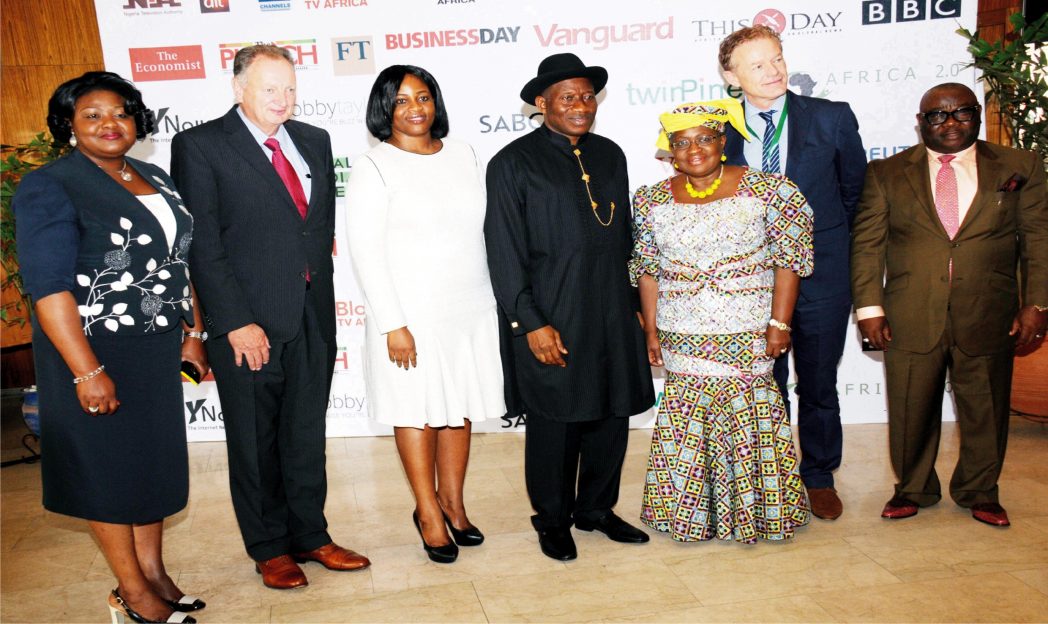Business
Yuletide: ATM Users Bemoan Fate In PH

From Left: Chairman, World Pension summit for Africa, Mrs Grace Usoro; Co-Chairman, World Pension Summit, Mr Harry Smorenberg; acting Director-General of PENCOM, Ms Chinelo Anohu-Amazu; President Goodluck Jonathan; Minister of Finance, Dr Ngozi Okonjo-Iweala; Co-Chairman, World Pension Summit, Mr Eric Eggink and Chairman, Senate Committee on PENCOM, Sen. Aloysius Etuk, at the World Pension Summit in Abuja.
Users of Automated Tell
ers Machine (ATM) have decried what they called disappointment and challenges experienced during the Christmas season while trying to withdraw money for the celebration.
The Tide reporter who moved round Port Harcourt City witnessed crowds that had different experiences at different ATM centers.
To a user, Mrs Peace Amadi, “it was a terrible experience for me because after being on line for more than three hours at Ikwerre Road, First Bank was told there was no money in the machine”.
She also noted that many cards were trapped in the machine, with the bankers refusing to return the cards to the owners, adding that the bankers said that Central Bank of Nigeria circular directed them to destroy other bank cards trapped in their system. Amadi stated that all these stories were not funny when people needed money to take care of needs at the home front.
Another user Mr Daniel Peters said the effect of the cashless policy and use of ATM was both negative and positive, as the policy drastically reduced robbery incident experienced in past years during the celebration time.
Peters said the ATMs only pay N20,000 at a time instead of N40,000, adding that this affected many customers who wished to withdraw N100,000 in the midst of the crowd.
To a user at Aba road, Mrs Chinemerem Ohunta, “I could not access my money for two days and even when I did, I had an ugly experience of being short paid by the machine. “I demanded for N5,000 and the machine paid me N3,000. I thought I made a mistake and had to press for another N2,000, only to be paid N1.500”.
She called on the banks to rectify these funny mistakes, stating that as people are getting used to the cashless policy, serious effort should be made by CBN and other relevant authorities to put things in order.
Another back customer at Trans Amadi Industrial layout, Mr Stanley John, wondered why ATM would be out of service at the time the customers are desperate to collect their money.
He noted that even with the lined up crowd, only one ATM would be working, while three others would be out of service, adding that this was unfair to the newly embraced cashless policy.
Business
PENGASSAN Tasks Multinationals On Workers’ Salary Increase

Business
SEC Unveils Digital Regulatory Hub To Boost Oversight Across Financial Markets

Business
NAFDAC Decries Circulation Of Prohibited Food Items In markets …….Orders Vendors’ Immediate Cessation Of Dealings With Products

Importers, market traders, and supermarket operators have therefore, been directed to immediately cease all dealings in these items and to notify their supply chain partners to halt transactions involving prohibited products.
The agency emphasized that failure to comply will attract strict enforcement measures, including seizure and destruction of goods, suspension or revocation of operational licences, and prosecution under relevant laws.
The statement said “The National Agency for Food and Drug Administration and Control (NAFDAC) has raised an alarm over the growing incidence of smuggling, sale, and distribution of regulated food products such as pasta, noodles, sugar, and tomato paste currently found in markets across the country.
“These products are expressly listed on the Federal Government’s Customs Prohibition List and are not permitted for importation”.
NAFDAC also called on other government bodies, including the Nigeria Customs Service, Nigeria Immigration Service(NIS) Standards Organisation of Nigeria (SON), Nigerian Ports Authority (NPA), Nigerian Maritime Administration and Safety Agency (NIMASA), Nigeria Shippers Council, and the Nigeria Agricultural Quarantine Service (NAQS), to collaborate in enforcing the ban on these unsafe products.
-

 Politics2 days ago
Politics2 days agoSenate Receives Tinubu’s 2026-2028 MTEF/FSP For Approval
-

 News2 days ago
News2 days agoRSG Lists Key Areas of 2026 Budget
-

 News2 days ago
News2 days agoDangote Unveils N100bn Education Fund For Nigerian Students
-

 News2 days ago
News2 days agoTinubu Opens Bodo-Bonny Road …Fubara Expresses Gratitude
-
News2 days ago
Nigeria Tops Countries Ignoring Judgements -ECOWAS Court
-

 Sports2 days ago
Sports2 days agoNew W.White Cup: GSS Elekahia Emerged Champions
-

 Featured2 days ago
Featured2 days agoFubara Restates Commitment To Peace, Development …Commissions 10.7km Egbeda–Omerelu Road
-
Sports2 days ago
Players Battle For Honours At PH International Polo Tourney

